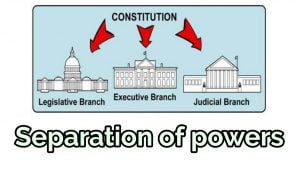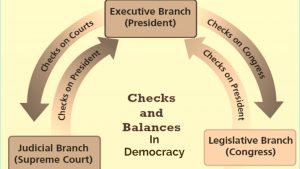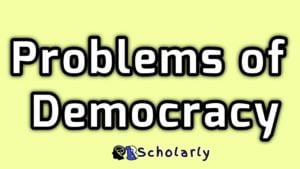Advantages And Disadvantages Of Democracy: A democracy is a political system that includes institutions that allow individuals to express their political views, limit executive authority, and protect civil freedoms. The two pillars that underpin the democratic principles of liberty are political participation and political contestation.
For a perfect democracy, free, fair, and competitive elections must be held. power must be seamlessly transferred from one person to another. After the votes have been tabulated and the winner has been proclaimed. Contestation refers to people’s ability to express themselves without fear through free speech and the press.

Recommended: Major pillars of a democratic system of government
Types of Democracy
The most important contrast analysts make between democracies is the nature of representative governance. The two forms of democracy are direct democracy and representative democracy.
a. Direct democracy: It is a system of governance in which all power is concentrated in the hands of a single individual. When a polity must make a decision, all of its members gather and vote. In theory, this appears to be the ultimate form of government. Everyone is treated fairly, and everyone gets a chance to participate in policymaking.
In practice, however, this strategy is difficult to implement. In small towns or indigenous groups, such a format works well since everyone knows each other and the issues being discussed directly affect them. On the other hand, if the electorate grows in size and the range of policy problems expands, direct democracy may become unmanageable.
b. Democracy by Representation: Our notion of how democracy should be implemented evolves as political communities develop and evolve. This political setup creates a link between the person and the state’s policy results. One person or a group of persons is chosen and given the responsibility of making choices on behalf of the citizens they represent through the election process.
There are several intermediates in the United States. In the upper chamber or Senate, each state is represented by two senators. The number of intermediaries appointed in the lower chamber, the House of Representatives, is determined by the size of each state’s population. While individual authority is marginally decreased, political officials remain obligated to the group they represent.
Recommended: 5 Reasons why democracy is considered the best system of government
Categories of Democracy as a system of government
The broad category of democratic “types” can be further subdivided into democratic “systems.” The parliamentary and presidential systems are two subtypes of representational government. Mixed regimes are a subcategory of the direct type. Electoral procedures, the balance of power between the president and the legislature, and the role of political parties are all variables that distinguish one system from another. Legislative bodies are present in every system.
Parliamentary System
In the globe, parliamentary democracies outnumber presidential democracies. Parliamentary systems differ from other forms of government in that they give the legislative branch more power. Voters choose parliamentary members in this institutional setup. The head of government, often known as the Prime Minister, Chancellor, or Premier, is appointed by the political party that obtains the most legislative seats.
The divided executive is a feature unique to this government. The heads of government and state make up the divided executive. The head of government directs the legislative process and determines the policy agenda as a member of parliament. The country’s ceremonial representation, on the other hand, is the head of state.
Presidential System
Only a minority of presidential democracies exist in the world, and they are all in the Americas (North America, Central America, and South America). While parliamentary democracies are more representative, they are also less stable, according to academics, for many of the reasons mentioned above. Presidential systems, on the other hand, are less representative and more stable since they concentrate authority in the executive branch.
To discuss and comprehend this democratic system, we shall utilize the example of the United States. Unlike parliamentary democracies, where elections are held in phases, voters in presidential systems elect members to both the executive and legislative institutions simultaneously. The executive branch’s makeup is unaffected by legislative election outcomes.
Mixed-Systems
Finally, some jurisdictions adopt a style of democracy that does not fit well into either the presidential or parliamentary models but incorporates aspects of both. These are known as “mixed” systems. In certain semi-presidential democracies, for example, the president is elected using direct democracy rules. The executive has a wide variety of powers in this system. He or she can be dismissed from office, exactly like in the legislative system.
Also see: Features/Characteristics of a democratic system of government
Advantages (Merits) Of Democracy
1. It guarantees that people’s rights are safeguarded: The important advantage of democracy is that it puts the demands of the people first. As a result, citizens have the freedom to travel around the country, voice their opinions on any topic, and vote out the government if it is not serving the best interests of individuals and the country.

All citizens, regardless of caste, income, or age, have equal rights and freedom under a democracy.
2. Credibility is established by democracies: Another advantage of democracy is that government is always in check because they know that if they do not work according to the expectations of the people of the country, they will be voted out, and thus the chances of the government misusing the taxpayer’s money and resources are lower than in countries without democracy.
3. Equal growth and development: Growth and development are not disproportionate, and it aims to create growth for all sectors of society by taxing the wealthy and providing subsidies to the poor and weak.
As a result, it strives to guarantee that money does not accumulate in the hands of a few wealthy individuals and that all inhabitants of the country benefit from the country’s progress.
Recommended: Major criticism of democracy
4. It inhibits the monopolization of power: Democracy avoids a monopoly of the governing authority since the government is bound by an election term in which parties strive for power.

And, because they will not be re-elected if their policies do not benefit the people, the elected governing party will make sure that their policies benefit the people.
5. It offers a little possibility of revolution: There will be little to no popular unrest because this system is built on the desire of the people. Elected officials manage state affairs with the backing of the people, and if they do not function effectively or match the public’s expectations, they will likely lose votes in the next election. As a result, the topic of revolution is rarely raised in democracies or other popular administrations.

6. It encourages people to make modifications: This political system is capable of bringing about changes in administration without resorting to bloodshed. It strives to make residents feel happy and even gives them a sense of connection and participation.
Recommended: Advantages and Disadvantages of one party system
7. It instills social responsibility in the populace: Because citizen elections are responsible for the governing authorities’ achievement, they should be grateful and hold them socially accountable. Citizens have the opportunity to pick their government, and this may act as a driver for them to work for the people.
8. Democracies guarantee that power is passed on smoothly: In a democracy, you may discover a certain level of openness that you won’t find in other governing arrangements. The checks and balances provided by this framework allow for seamless transitions when governments or leaders change.
There are no disagreements regarding who will be the appropriate heir to any government job. This is due to the fact that each office is either elected by the people or filled by someone who previously won an election.
Also see: Countries with the best judicial system in the world
9. There is no centralized power structure under democracy: The goal of democracy isn’t to wield enough authority over the broader public to be able to dictate how each individual lives their life. It prefers to give individuals the freedom to make their own decisions.
Every voter has a say in the day-to-day operations of the government. When elected authorities fail to fulfill their duties, communities may band together to achieve the necessary reforms to restore what they want.
In a democracy, every vote is a source of power. Rather than relying on the government to tell people what to do, this paradigm allows people to maintain control over their own lives.
Recommended: Richest former president in Africa
10. Majority rule: Majority rule is an imperative feature of democracy. The concept implies that in all cases, the view of the majority prevails over that of the minority. This can be seen in various sectors of democratic governance. For instance, in the adjudicatory process, the judgment of the majority judges stands; in an election process the majority vote wins; in the legislative process the majority rule is a determinant of outcome, in a referendum the majority prevails, and so on.
This operates as an advantage because the majority view represents the view of a greater portion of the society. More so, the target of a democratic system which is best is to satisfy the interest of the majority. Thus, all interests cannot possibly be met, but fulfilling that of the majority is the greatest achievement. The majority view represents the view of the people.
Recommended: Advantages and Disadvantages of a written constitution
Disadvantages (Demerits) Of Democracy

1. The Sheep Mentality: The major disadvantage of democracy is that people are more likely to be swayed and follow sheep mentality, voting in favor of inept governments, and there is no way to reverse that decision since in a democracy, the government is only in power for 3 or 5 years.
An ineffective administration lasting five years indicates the country is regressing, and it takes decades to correct incompetent governments’ mistakes. As a result, it is preferable for an illiterate voter to abstain from voting than to vote for inept political parties.
2. Bureaucracy: Another restriction of democracy is that corruption is common in government offices and departments due to bureaucratic culture, which makes a farce of all government programs and schemes since the true benefit of excellent policies does not reach the people for whom they are intended.
In basic terms, the government in a democracy attempts to do the right thing intellectually, but on the ground, it does not help the people, causing unhappiness among the country’s citizens.
Recommended: Characteristics of the first generation computer
3. The establishment of democracy takes a long period: Another downside of democracy is that because the government must seek consensus from all parties on critical policy matters and choices, it causes delays in decision-making and policy paralysis, which has a significant negative impact on the country’s GDP and long-term economic trajectory.
4. Voters in democracies must have access to sufficient and reliable information: If the votes cast on decisions are not based on meaningful facts, the democratic framework will not perform successfully.

To have a beneficial influence on society at large, each ballot must be cast from well-researched and well-thought-out viewpoints. When individuals vote without enough information, negative consequences result, such as damaging laws or superfluous services.
5. The majorities will determine the framework of democracy: History has taught us that following the majority’s will is not necessarily the ethical or moral path to pursue. Slavery, discrimination, and gender inequality have all been addressed in the past because people with the most votes believe that society needs to have such components.
Though someone frequently finds himself outside the majority’s will, it may feel as if their vote is meaningless.
Also see: How to answer law problem questions using IRAC Method
6. Individual voters may be required to approve the complete mandate for a particular issue: Conservatives in the United States claim that voting for the ordinary Democrat is difficult due to their pro-abortion sentiments. When it comes to LGBTQIA+ rights, liberals would argue the same thing.
Voters must accept a full manifesto to vote on subjects that are crucial to their needs unless a direct democracy system is in place. Rather than having a candidate who actually represents them, people must choose the platform that is most similar to their viewpoint.
7. Political gridlock is a risk for democracies: Politicians in a democracy are also affected by polarization, which prevents people from accepting various viewpoints. It is not uncommon for government checks and balances to cause unnecessarily long delays in the implementation of laws.

Even if there is no political impasse, you will be subjected to continuous debates and alliances that strive to hold things together.
Recommended: How To Make Your Brain Smarter and Faster
8. Human intricacies and compromise: Due to human intricacies, selfishness, corruption, incompetence, mob action and so on, democracy tends to be compromised. Hence, many states are not anywhere close to the ideal concept of democracy in their practice; hence, the saying that democracy is more of an idea than a practice.
Recommended: Advantages and Disadvantages of Two Party System
Conclusion
Democracies, in comparison to other regime types, place the greatest checks on government authority while also providing the highest protection for individual civil rights and liberties. There is no such thing as a “perfect” democracy.
Every democracy has its own set of strengths and weaknesses. What matters is that democratic structures and the qualities, needs, and interests of the state in which democracy operates are complementary. When there isn’t such complementarity, democratic ideals of tolerance and discussion enable for improvement.

Edeh Samuel Chukwuemeka, ACMC, is a lawyer and a certified mediator/conciliator in Nigeria. He is also a developer with knowledge in various programming languages. Samuel is determined to leverage his skills in technology, SEO, and legal practice to revolutionize the legal profession worldwide by creating web and mobile applications that simplify legal research. Sam is also passionate about educating and providing valuable information to people.